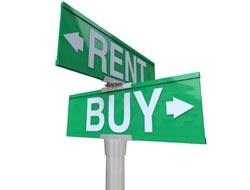It seems like everyone either owns a home or is saving to purchase a home. Certainly, there are significant financial and tax reasons for owning a home. While you typically only make a down payment of 10 or 20 percent of the home’s cost, you retain all price appreciation on the home. Part of each mortgage payment builds equity in your home. In the beginning, that may only be a small portion of each payment, but significant equity can be accumulated over a period of years. Historically, homes have provided a good hedge against the impact of inflation.
There are also significant tax advantages to homeownership. You may be able to deduct mortgage interest and property taxes, reducing the cost of owning your home.
When you sell the home, you may be able to exclude your profit from taxes. If the home was your primary residence in at least two of the preceding five years, you can exclude $250,000 of gain if you are a single taxpayer and $500,000 of gain if you are married filing a joint return.
But despite these advantages, you should still evaluate whether owning a home makes sense for your particular situation. Some factors to consider include:
How long will you live in the home? Besides the purchase price of the home, you must pay closing costs, which can add substantially to the cost. There are also costs involved when you sell the home. Thus, you’ll usually need to live in the home for at least five to seven years to make it a worthwhile financial decision. If you plan to move before that, carefully calculate your costs before purchasing.
Many people end up living in their homes for decades. You, too, can lock in your monthly mortgage payment with a fixed rate loan. Your mortgage payment will remain the same no matter how high inflation pushes other costs.
Can you afford to take on the debt? Generally, lenders prefer that your total debt payments, including your mortgage debt and other consumer debts, not exceed 43 percent of your income. Don’t simply rely on this rule of thumb. Make sure you’re comfortable with the amount of debt you are incurring and that you’ll still have enough disposable income to meet your current and future expenses.
Do you have down payment money? You might be surprised to hear that you can purchase a home with no money down (if you’re a veteran). Other programs let you put down just 3.5 percent. Talk to me about what’s available in our market.
If your down payment is less than 20 percent, you’ll have to pay private mortgage insurance, which can typically total .25 to 1.25 percent annually of your mortgage balance.
Have you considered all costs? Besides the mortgage payment and property taxes, there are other costs involved with owning a home. For instance, you’ll be responsible for all utilities, insurance, and repairs and maintenance on the home.
